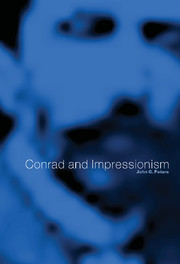Book contents
- Frontmatter
- Contents
- Preface
- Acknowledgments
- List of abbreviations
- Introduction. Objects of consciousness in Conrad's impressionist world
- 1 Subject/object: science and the epistemological origins of literary impressionism
- 2 Objects and events in the “primitive eye”: the epistemology of objectivity
- 3 Other-like-self and other-unlike-self: the epistemology of subjectivity
- 4 “Sudden holes” in time: the epistemology of temporality
- 5 Radical relativism, epistemological certainty, and ethical absolutes: Conrad's impressionist response to solipsism and anarchy
- Epilogue
- Notes
- Selected bibliography
- Index
3 - Other-like-self and other-unlike-self: the epistemology of subjectivity
Published online by Cambridge University Press: 22 September 2009
- Frontmatter
- Contents
- Preface
- Acknowledgments
- List of abbreviations
- Introduction. Objects of consciousness in Conrad's impressionist world
- 1 Subject/object: science and the epistemological origins of literary impressionism
- 2 Objects and events in the “primitive eye”: the epistemology of objectivity
- 3 Other-like-self and other-unlike-self: the epistemology of subjectivity
- 4 “Sudden holes” in time: the epistemology of temporality
- 5 Radical relativism, epistemological certainty, and ethical absolutes: Conrad's impressionist response to solipsism and anarchy
- Epilogue
- Notes
- Selected bibliography
- Index
Summary
“One's own personality is only … something hopelessly unknown.”
“Letter to Edward Garnett”In representing objects of consciousness, Conrad does not limit himself simply to physical objects, but also considers human subjects. Knowledge of objects begins with impressionist perception, as does knowledge of subjects, as Conrad focuses on both self and other – and more particularly on their interrelationship. In an article on “Heart of Darkness,” Eric Tretheway refers to “the question that Conrad never ceased to worry throughout his career, that of the possibility of shaping a ‘substantial,’ coherent self.” Various other commentators have also looked at Conrad's conception of the self. A common feature of these investigations is that they look to the self for knowledge of the self. Similarly, commentators on perception of other human beings look to the other for knowledge of the other. These commentaries on self and other consistently imply that self and other are distinct and self-contained entities. In contrast to this separation of self and other, I would argue that Conrad presents a necessary link between the two, between subject and object, in coming to any knowledge – however limited – of human subjectivity. The self alters the other, just as the other alters the self, and in the space between them exists the possible epistemology of subjectivity.
Conrad is concerned with subjective knowledge throughout his works, but Lord Jim provides perhaps the best example of his inquiry into human subjectivity and its relationship to western civilization.
- Type
- Chapter
- Information
- Conrad and Impressionism , pp. 61 - 85Publisher: Cambridge University PressPrint publication year: 2001



